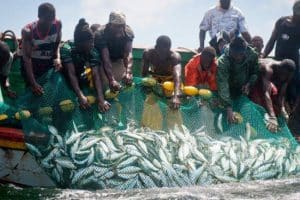The Nigerian Trawlers Owners Association (NITOA) has expressed concern about the diminishing prospects of fishing and trawling businesses in the country.
The association and other stakeholders have urged the Federal Government to urgently intervene to prevent the total collapse of the sector, citing a yearly loss of over $100 million due to a decline in fish exports.
The association emphasized that the soaring price of Automobile Gas Oil (diesel), among other factors, has emerged as a significant hurdle, warning that failure to promptly address it could lead to the complete shutdown of the fishing industry business.
President of NITOA, Ben Okonkwo, lamented recently on the bad state of the sector at the 2024 stakeholders’ engagement on enhanced activities in the blue economy sector.
She stated that NITOA, representing all companies engaged in industrial fishing, shrimp trawling, and processing for both domestic and international markets in Europe, America, and the UK, is a vital non-oil export sector that has bolstered Nigeria’s economy through foreign exchange earnings.
The NITOA president emphasized that apart from generating foreign exchange, the association also provides employment opportunities for Nigerian citizens, expressing regret over the significant decline in industry employment levels attributed to high operational expenses.
Okonkwo said, “We had about 250 boats, when the association came under a unified body in 1986. And we had over 100 thousand workers across board direct and indirect.
“At a time, the business fortunes of these companies nosedived due to pirates’ attacks. Difficulties in assessing forex for foreign transactions, and procurement of it too. The atmosphere was no longer favourable, thus forcing many investors to either divert their funds to other ventures, or parked up finally. At the moment, there are eight-member companies, with about 156 vessels, of both big and medium sizes. The workforce now is 10,000, including auxiliary staff.
“NITOA member companies are not averse to any policy direction that will grow the fisheries industry. We are urging the relevant agencies to engage more stakeholders’ forums in finding solution to the myriad challenges facing the sector.
“AGO is about more than 70 percent of input into our operations. This cost of operation has no alternative because there is no option to AGO for our kind of operations. We cannot talk about renewable energy, it is not a sure operation.
“So, AGO is something we can’t do without. It costs 30 to 40 million in the past to embark on a normal voyage. Now we are using 100 million to 140 million depending on sea days in naira. The cost had gone so high, I don’t have adjectives to qualify it, we are becoming scared by the day of what the future maybe, if this sub-sector goes under.
“We need support from the government. Any reduction in price with the help of government for this sub-sector will go a long way. Because of AGO, 40 to 45 percent of our vessels are down.
“The jetties, all have vessels tied down, when we tie down vessels, there is an extent we can go paying our staff. It will get to a stage, if they are not productive, we have to let them go and you know what that entails in terms of unemployment. If we can get some logistics arrangement through NNPC and Dangote, it will go a long way.”
The NITOA president clarified that the fishing sub-sector annually generates between 80 to 100 million US dollars, emphasizing the requirement for reduced or discounted cost of AGO.
She also emphasized the need for duty waivers on numerous component parts of imported vessels, as there are no manufacturing plants for such parts in the country.
Okonkwo discussed their operational base at ports controlled by the Nigerian Ports Authority and terminal operators.
She highlighted challenges with cabotage regulations and emphasized the need for streamlined government regulations.
The NITOA president also stressed the potential for job creation and industry growth with support, advocating for dedicated terminals for new entrants into the fishing business.
The post Over $100 Million Lost Yearly As Nigeria’s Fish Export Trade Stalls appeared first on Naija News.







